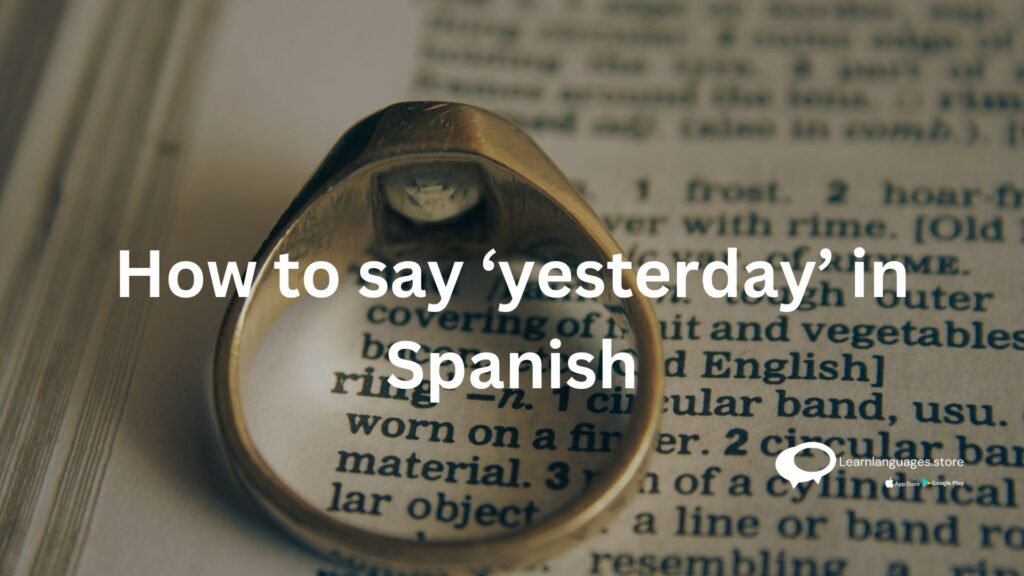How to say ‘yesterday’ in Spanish just like native speakers
How to say ‘yesterday’ in Spanish just like native speakers
Do you have a burning desire to learn Spanish and emulate native speakers’ pronunciation? Here, we’ll go through various Spanish expressions for “yesterday.” You will be able to carry on many Spanish discussions with ease if you become familiar with the various ways to pronounce “yesterday.”
Estimated reading time: 7 minutes

What does “yesterday” sound like in Spanish? The answer is Ayer, plain and simple. However, you will probably hear more than simply Ayer if you chat with a native speaker. Thus, mastering just one word is insufficient in this context. We shall discuss various Spanish expressions for “yesterday” in this tutorial. So go ahead and get a pen and pencil.
What is yesterday in Spanish

1. Ayer
We use this word to talk about the day immediately before today. For example:
– “Enrique me vio ayer en el parque y no me saludó, ¿será que le hice algo?”
Translation: Enrique saw me yesterday at the park, and he didn’t say hi to me. Could I have done something to him?
– “Ayer te estaba esperando, pensé que vendrías a mi casa, ¿qué pasó?
Translation: Yesterday, I was waiting for you, I thought you were coming home, what happened?
– Ayer no fui a clase
Translation: I didn’t go to class yesterday.
Because we are speaking in the past tense, we must use the preterite or the imperfect, just like we do in English. Pretty easy, right?
You should look for simple strategies to learn Spanish. In reality, using examples while learning Spanish is a terrific method to comprehend how words and idioms are used in different contexts.
2. El Ayer
When we say “el ayer,” we are identifying the day before today. It simply means “yesterday,” as if it were more than a time adverb. We don’t use this word very often in everyday conversation because it sounds a little poetic. But here are a couple of examples to build your understanding:
– “El ayer es historia, lo que importa es el hoy”.
Translation: Yesterday is history, what matters is today.
– “Sigues mirando hacia el ayer, como si tu ex aún pensara en ti”.
Translation: You keep looking towards ‘yesterday’ as if your ex would still think about you.
3. Ayer en la mañana
We use this phrase to talk about what happened before noon the day before. Let’s have a look at some examples:
– ¿Cuándo llegaste entonces?
Translation: When did you get here then?
– Ayer en la mañana, mi vuelo se adelantó. ¿Por qué no fuiste al aeropuerto… pensé que ibas a estar ahí.
Translation: In the morning yesterday, my flight was earlier. Why didn’t you go to the airport? I thought you were going to be there
– Ahh pues, ayer en la mañana tuve que salir de urgencia para la oficina.
Translation: Oh well, in the morning yesterday, I had to go to the office urgently.
You can also use an online Spanish dictionary if you get stuck somewhere. These online dictionaries are super helpful in knowing the meanings of difficult Spanish words you come across while learning.
4.Ayer en la tarde
This is yesterday in the afternoon, so we can describe something that happened in the afternoon the day before today, such as this:
– Bueno, ¿y en la tarde?… ¿por qué no viniste a verme ayer en la tarde?
Translation: Well, then, how about the afternoon?… Why didn’t you come to see me yesterday in the afternoon?
– Pues… ya sabes, salí de la oficina y… bueno… no recuerdo ¿qué hice ayer en la tarde?… ah sí, ayer en la tarde mi mamá fue a visitarme, así que salí para la casa apenas terminé de trabajar.
Translation: Well… you know, I went out of the office and… well… I don’t remember, what did I do yesterday in the afternoon?… oh yeah, yesterday in the afternoon my mom went to visit, so I went home as soon as I finished working.
– Ya veo, parece que ayer en la tarde estabas muy ocupado.
Translation: I see, looks like you were very busy yesterday afternoon.
5.Anoche
This one is more common to hear in daily life, and even in music. It’s pretty straightforward so here are a couple of examples using anoche:
– Anoche soñé contigo, creo que fue mi peor pesadilla.
Translation: Last night I dreamt about you, I think it was the worst nightmare.
– ¿A dónde fusite anoche? Te estuve llamando y no contestaste.
Translation: Where did you go last night? I called you and you didn’t answer.
– Me fui a dormir temprano anoche.
Translation: I went to bed early last night.
6.Antenoche
This is the night before the previous night. This may be difficult for English speakers to grasp because it was only two nights ago. And if you say “dos noches atrás,” which is the equivalent, people will understand what you mean.
For example:
– “Antenoche hubo un accidente en la autopista, dos carros chocaron, pero no hubo muertos”.
Translation: Two nights ago there was an accident on the freeway, two cars crashed, but nobody died.
– “Mamá estuvo muy enferma hasta antenoche, anoche empezó a mejorar y ahora está mucho mejor.”
Translation: Mom was pretty sick until two nights ago, last night she felt better and now she’s much better.
7.Trasantenoche or trasanteanoche
“Trasantenoche” means “three nights ago.” You should avoid using this strange word because it is not commonly used in everyday conversation. Yet, some people are still going to use it, especially old Spanish native speakers. Let’s have a look at some examples:
– “Trasantenoche vino la policía y registró toda la casa, no sé que buscaban”
Translation: Three nights ago cops came and registered all the houses, I don’t know what they were looking for.
– “Honestamente, no te recuerdo, ¿cuándo dices que nos conocimos?
Translation: Honestly, I don’t remember you, where did we meet?
– ”Trasantenoche, en el supermercado, que usted estaba con su esposa”
Translation: Three nights ago, at the supermarket, you were there with your wife.
8. Antier
This word refers to two days. People used to talk about the day before yesterday. This adverb does not specify what time of day it refers to. As a result, people may refer to the morning, afternoon, or night. For example:
– “Tu papá estuvo por aquí. Pagó todo lo que me debías.”
Translation: Your father was here last night. He paid everything you owed me.
– ¿En serio? ¿Cuándo fue eso?
Translation: Really? When was that?
– Antier, como a las 7 de la noche
Translation: The day before yesterday, like at 7 p.m.
9. Trasantier
This word, like “trasantenoche”, means three days ago. This is the final “evolution” of the word “ayer,” which works just like antier. For example:
– Trasantier fui a la tienda de mascotas, pero no tenían comida para perro.
Translation: I went to the pet store three days ago, but they didn’t have dog food.
Frequently asked questions
Q. What is the difference between Hoy and Ayer?
A. “Hoy” is an adverb that is often translated as “today”, and “ayer” is an adverb that is often translated as “yesterday”.
Q. Is Ayer imperfect or preterite?
A. Although ayer is not a verb that can be in either preterite or imperfect form if it appears in a sentence, it usually indicates that the verb should be in preterite form because it refers to a specific point in time.
Q. What does no naci ayer mean?
A. It means ‘I wasn’t born yesterday’.
Conclusion
You can engage in many different Spanish discussions by becoming familiar with the various ways to say “yesterday” in Spanish. We looked at nine different ways to say yesterday in Spanish in this guide. Utilize the examples offered throughout the guide to help you comprehend them. learn with learnlanguage.store

Learn Languages Store
Vashi,
Email: services@learnlanguages.store










